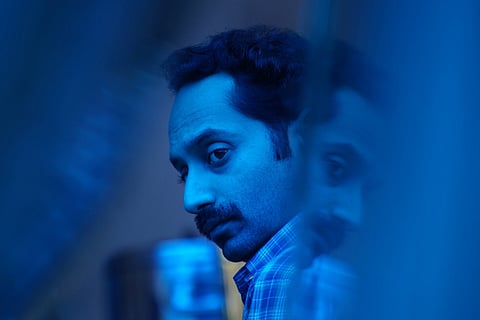

Ever since Kumbalangi Nights and its marvellous villain Shammi, Fahadh Faasil has built himself a reputation for playing characters who go over the edge. In Sajimon Prabhakar’s Malayankunju, he plays Anikuttan, a bigoted repairman for electronic goods who is hypersensitive to sound. And then, the family next door brings home a newborn.
The constantly wailing baby breaks Anikuttan’s focus as he tries to fix the devices that clutter his room. The room may look cramped and functional to the average onlooker, but it is Anikuttan’s universe. A claustrophobia-inducing space that he willingly embraces. It’s a metaphor that makes more and more sense as the film progresses.
It’s hard to empathise with Anikuttan. He is blatantly casteist; he walks around with a surly expression on his face; he treats his kind and generous mother (Jaya Kurup) with apathy. The only time we see some emotion in him is when he takes extra pains to fix a young woman’s laptop. She seems to care about him, too, but the script doesn’t explore this angle beyond suggesting that somewhere within Anikuttan’s rigid exterior, there lies a beating heart.
The story unfolds in peak monsoon, in a small village in the hilly region of Idukki. The sound design succeeds in creating a menacing, apocalyptical world where nature is a force to reckon with. The characters have to scream to be heard over the sound of the pouring rain.
We already know from the promos that the film is a survival thriller and is based on a real life landslide. We know that the film is hurtling towards this inevitable situation, so the job of the script is to flesh out the characters and make us want to root for their survival. But this is where Malayankunju slumps. Other than Anikuttan, the rest of the characters hardly receive any attention. They’re uniformly nice. Anikuttan behaves abominably with his Dalit neighbour but the very next day, all is forgotten and the neighbour invites Anikuttan home for a celebration. There is an explanation for why Anikuttan is this way, but it seems like a rather convenient effort to whitewash his bigotry.
Rajisha Vijayan plays Anikuttan’s sister, Sandhya. Though she is effective in the limited screen time that she’s given, the character itself receives the short end of the stick. Jaffer Idukki plays Anikuttan’s father. Again, there isn’t much to say about him other than the fact that he’s a very nice man. The bond between father and son is crucial to the film but it feels underdeveloped. Anikuttan’s ‘transformation’ over a single dialogue is too sudden and unconvincing. Are we to read it as his prejudices being literally washed away?!
There is a lot to like about Malayankunju. The storytelling is never boring; the flashback that reveals Anikuttan’s troubled past, for instance, is told through a wedding video made with a shaky handheld camera. He watches it in his small room, in the same TV and CD player that he turns to for comfort. The dialogues are minimal and most of what we experience is through Fahadh’s frenzied eyes and his faltering screams. The underwater sequence is stunningly conceived and shot. The art direction is impeccable and so is Fahadh’s performance as he struggles in the mud that threatens to bury him alive. AR Rahman’s background score mostly underlines the urgency and poignance of key moments in the film, but at times, it feels intrusive.
Anikuttan’s journey is a rebirth of sorts. From his closed, dark mind to a dawn that he has fought hard for. Real life is full of instances when horrible human beings have performed extraordinary and unexpected feats. So, it’s not that the story isn’t believable – it’s just that for the viewer to buy this leap, we need to be immersed in the character’s psyche. That doesn’t happen because the writing is too sparse. I didn’t for a moment worry about Anikuttan’s safety or of the person he’s trying to save. Rather, it is the technical prowess of the film that my mind was occupied with. This defeats the purpose of a survival thriller where, ideally, you should empathise with the characters to an extent that you can barely breathe, let alone appreciate with detachment how it’s been made.
Despite its flaws though, Malayankunju makes for a fairly engaging watch and is among the better survival thrillers to come out in recent times. Fahadh and the technical crew make sure of that.
Disclaimer: This review was not paid for or commissioned by anyone associated with the film. Neither TNM nor any of its reviewers have any sort of business relationship with the film's producers or any other members of its cast and crew.